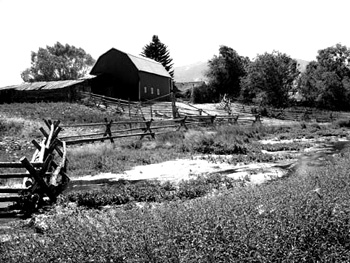|

February – April
By Richard Fammerée
She is the woman and ghost of the girl
who pretended in this solitary barn, who gazed
through these slats in the back where I now
sleep. Each restless, standing stalk is the shiver
of her, and the wind is an aunt on her
mother's side, the one who lost her
husband to light between clouds.
Her body is hillocks, pond and spring, long
planted and greener before. Her spine is
the trysting tree from the time of the
grandparents. It is where they meet
and court. Birds turn and return. Her girls
come back. The wind sails their hair
in three directions: light, silk, conifer.
Before sleep one night she read my spine.
Roots above are as roots below.
We are the same.
I root in your body where our dead wait to be planted.
We pray upside down and right side up like a tree.
We made paths as deer. We crossed hills of lone
apple trees where she remembered orchards.
Thorns were still angry, she was still angry,
and the inland sea swollen.
All vessels are fragile, she surprised me. Still, a soul
sails on. There is no night or day or death.
And when two signal, I did not say aloud, from
whatever distance, no end of the world or world
between can prevent them.
The moon became a milky wafer melting in cocoa.
How gentle, how unexpected.
A man and woman eclipsed like that alone
upon a strand, all humanity, all history awaited
our decision.
I told her, We'll always be together, but like ghosts,
like this. My hands demonstrated an empty
vessel, a frail cup which would hold nothing
for long.
And, then, of course, the moon was gone.
When she left, as I knew she would [though
I had predicted to Peter that she never would —
after dressing each sad window with lace (a gift
from her French mother) and the raw ceiling
with a lamp (hung by her Welsh father); after
the feverish night she had lain beside me and
sat beside me as I writhed] I was surprised
at my grief and the tears — foreign things, foreign
as time — falling upon my hands.
|
